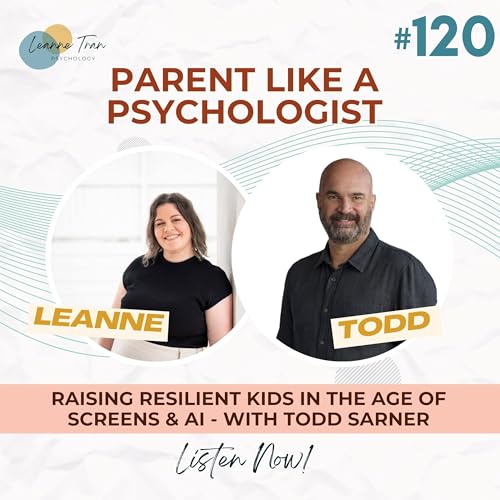What does it really take for a girl to grow up liking herself in a world that constantly tells her she’s not enough?
In this episode of Parent Like a Psychologist, I sit down with bestselling author and researcher Kasey Edwards to unpack the key ideas behind her book Raising Girls Who Like Themselves. Kasey and her husband, Dr Christopher Scanlon, spent 10 years investigating what helps girls develop genuine confidence, strong self-worth, and a clear sense of who they are.
Together, we explore the seven foundations that help girls feel strong and secure:
• Body ownership & body safety
How everyday rules about clothing, affection, and appearance shape a girl’s belief about who her body belongs to, and how body autonomy protects her throughout her life.
• Confidence built on mastery
Why stepping back, letting kids try hard things, and allowing them to fail is essential for resilience and true self-esteem.
• Moving beyond beauty-focused praise
Girls hear more appearance-based comments than anything else. Kasey explains the hidden harm behind this, and what to focus on instead to build inner strength.
• The “power perspective”
A simple shift that teaches girls to value their own opinions over external approval, including Kasey’s brilliant “flipping praise” strategy.
• Teaching girls to ask, not hint
How socialisation teaches girls to wish, hint, and wait, and how to help them ask directly for what they want.
• Independence, responsibility & speaking for themselves
The small daily interactions that shape a girl’s confidence at school, socially, and with adults.
• Raising a girl who is truly herself
Kasey shares the idea of “seed parenting vs stone parenting,” and how nurturing who our kids naturally are helps them thrive.
This is a warm, honest, and deeply practical conversation for any parent raising daughters in today’s world.
Listen now If you’re raising a girl, or you simply want to better understand how to support the girls in your life, this episode is a must-listen.
Want more support? If you’re looking for practical tools to feel calmer and more confident in your parenting, explore my parent programs here:
👉 Parent Courses Available Now, start anytime, no waitlist
(Link Here)
Follow me on:
Instagram:@leannetranpsychology
Facebook: @Leanne Tran
Linked In: @leannetranpsychology
Email me: hello@leannetran.com.au
Visit my website: learn.leannetran.com.au
 15 分
15 分 51 分
51 分 58 分
58 分 1 時間 23 分
1 時間 23 分 58 分
58 分
 22 分
22 分 2025/11/0319 分
2025/11/0319 分
